![]()
Sun, May 29, 2011 | The Meir Amit Intelligence and Terrorism Information Center
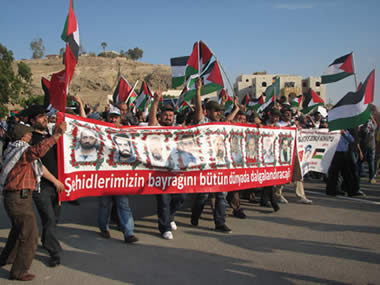
The Turkish delegation marching towards Allenby Bridge, followed by Palestinian and Jordanian activists carrying a large poster with photographs of the nine activists killed on board the Mavi Marmara. Violent clashes broke out when the procession encountered a roadblock deployed by the Jordanian security forces (Velfecr, May 19, 2011). The text on the poster reads: “The flag of our shaheeds flies all over the world”.
Turkish Islamist Delegation uses Violent Methods during anti-Israeli Propaganda Activities
A Turkish Islamist delegation, which in our assessment included IHH activists, was involved in violent clashes with Jordanian security forces near Allenby Bridge on Nakba Day. The incident is yet another demonstration of the violent methods used by the IHH and its Islamist allies during anti-Israeli PR activities.
Overview
A small Islamist delegation from Turkey referring to itself as the “Palestine Return Day March” took part in the events of Nakba Day (May 15), whose main theme was the “right of return”. Six of the delegation’s participants were on board the Mavi Marmara last year.
The organizer of the Turkish delegation, and one of its members, is an anti-Israeli, anti-Semitic, and anti-Western journalist named Nureddin Şirin, who in 2008 publicly called to eradicate the regimes of President Mubarak and Jordan’s King Abdullah, who allegedly “betrayed the Muslims”. The delegation’s contact in Turkey was an Islamist journalist named Hakan Albayrak, who in 1994 was the chief of the IHH humanitarian aid mission in Bosnia and in 2003 was sentenced to 15 years in prison for opposing Ataturk’s reforms. On May 15, 2008, both journalists led an anti-Israeli, anti-Western demonstration in front of the Israeli embassy in Turkey on the occasion of Nakba Day.
In Jordan the Turkish delegation took part in a procession referred to as the “March of Return”, which left the village of Karameh and moved in the direction of Allenby Bridge. Its participants were Palestinians and Jordanians carrying such slogans as “Returning, returning”, “The sacred right of return”, “Millions of shaheeds are marching on Jerusalem”, and “With our soul and blood we shall redeem you, Palestine”. They refused to follow the instructions issued by the Jordanian security forces, tried to force their way towards the border, and clashed with the security forces. One demonstrator was killed and dozens were wounded in the violent confrontations. The front line of the procession that confronted the Jordanian security forces consisted of activists who had come from Turkey. Five of them were wounded, and damage was caused to their bus.
It is the third incident in the past year and a half where Islamist activists from Turkey, including hardcore operatives belonging to IHH and its allies, are involved in violent clashes with security forces in Israel, Egypt, and Jordan (the Viva Palestina convoy, the Mavi Marmara flotilla, and the march on the Israeli border near Allenby Bridge).
As part of the preparations for the upcoming flotilla, in which IHH plays a major role, Bülent Yıldırım continues his defiant, provocative statements about his men’s willingness to martyr themselves to achieve the flotilla’s objectives.[1] Analysis of methods employed by IHH in the past indicates that such statements are to be taken seriously, even though IHH leader Bülent Yıldırım said, “We will not carry even a single pocket knife in our pockets” (similar “appeasing” statements were made by Yıldırım during the Mavi Marmara flotilla).[2]
The arrival of the Turkish delegation at the Jordan-Israel border
The arrival of the Turkish delegation from Turkey to Jordan is described in considerable detail on a Turkish Islamist website affiliated with IHH (velfecr.com). The account was written by Nureddin Şirin, an Islamist, anti-Israeli, anti-Semitic, and anti-American Turkish journalist who organized and took part in the delegation to Jordan (see Appendix I for more details on Nureddin Şirin).
The following is a description of the delegation’s journey from Turkey to the Jordan-Israel border:[3]
a. The Turkish delegation rented a bus to get to Jordan via Syria. On Saturday, May 14, the bus with 28 delegation members on board arrived at the Turkey-Syria border crossing in Hatay (Alexandretta). They were at first refused entry by the Syrian authorities, since some of them had taken part in the Mavi Marmara flotilla and had an Israeli stamp in their passports. Once they were able to persuade the Syrian authorities to let them through, they were permitted to cross Syria on their way to Jordan.
b. Due to the delay on the Turkey-Syria border, the delegation members were concerned that they would not reach Jordan in time. Consequently, they considered going to Maroun al-Ras in southern Lebanon to take part in a similar demonstration. As a last resort they considered taking part in a demonstration on the Golan Heights.
c. As the Turkish delegation was approaching Jordan, its members learned that 15 Palestinians had died as shaheeds in Maroun al-Ras and on the Golan Heights. After exhausting negotiations with the Jordanian customs, they decided to go to the rendezvous point in Karameh, on which they had agreed upon with the “organizer of the Nakba Day in Jordan (whose identity is unknown). Ultimately, however, they met with him near a mosque in Amman where they held posters saying “Long live Turkey”. From there, the bus headed to the Jordan-Israel border, in the vicinity of Karameh.
d. After a one hour drive from Amman, the bus stopped about 2 miles from the border, in the region adjacent to Jericho (probably near Karameh). Once there, the Turkish delegation intended to march on the border (probably to Allenby Bridge) with the Palestinians. At that point, however, the Jordanian regime, depicted by Nureddin as “a strategic ally of the Zionists”, erected a roadblock in front of the marchers and the Jordanian security forces prevented them from coming any closer to the border.
e. Even though the Jordanian security forces did not allow the marchers to advance, the Turkish delegation members (and the Palestinians marching with them) were “determined to march towards the border and make it through the roadblock”. They were faced with the Jordanian security forces (“a Zionist wall”, according to Nureddin’s account). The first line of marchers consisted of Turkish participants holding a poster with photographs of the Mavi Marmara shaheeds. Other demonstrators waved the flags of Palestine and Turkey.
f. Confrontations between the Turkish activists and the Jordanian security forces (police and commandos) broke out during the first phase of the march. After several Palestinians were detained by the security forces, the Turkish participants decided to march towards the police car to “rescue the detained colleagues”. Jordanian commandos started beating them and compelled them to retreat.
g. After several failed attempts to break through the Jordanian roadblock that hindered the demonstrators’ progress towards the border, the Turkish activists waited for the evening to come to try and reclaim the initiative. Turkish activists carrying the poster with the photographs of the Mavi Marmara shaheeds stood on the front line, followed by the Palestinians and the Jordanians. Members of the Turkish delegation marched resolutely, chanting slogans in favor of Turkey. When the Jordanian security forces realized that they would not be able to prevent the marchers from advancing, they began beating its members with police batons and firing tear gas. The participants dispersed and the Turkish delegation members began “retreating” on the bus that had brought them there.
h. At this point, according to Nureddin, the Jordanian security forces decided to punish the procession participants. Intelligence officers in plain clothes started pelting them and the bus with stones. All the bus windows, including the back window, were shattered as a result. Nureddin points out, “In fact, sights like these have not been seen even in the Zionist regime, but the Jordanian regime used considerable force to protect the Zionist regime.”
i. During the pelting of the bus, a delegation member named Jamal felt a pain in his heart and lost his consciousness. Another delegation member (“Abdullah”) called Hakan Albayrak (an Islamist journalist who took part in the Mavi Marmara flotilla; see Appendix I for details) to report the incident. Hakan contacted the Turkish Foreign Ministry and asked for protection for the Turkish bus passengers. Representatives from the Turkish embassy in Jordan then contacted the passengers of the bus, en route from the Allenby Bridge region to Amman, and made arrangements to have the participant whose heart had malfunctioned taken to a hospital.
Nureddin Şirin described the confrontations between the Turkish delegation and the Jordanian security forces to his Palestinian friends: “Today we were attacked by the Jordanian security and police forces, which acted as an extension of the Zionist regime. They prevented us from approaching the Palestinian border. However, we will meet you again, and this time we will reach the heart of Palestine and celebrate our victory in the free city of Al-Quds [i.e., Jerusalem]. We are willing to sacrifice our soul and blood for Palestine, Al-Quds, and Al-Aqsa. We are all soldiers of Al-Quds. Long live Al-Quds. Long live the uprising” (Velfecr, May 19).
Reactions to the participation of the Turkish delegation in the Jordanian Nakba Day
On May 20, 2011, the website of the Turkish Islamist newspaper Velfecr published an article by Nureddin Şirin titled “The Israeli regime and the Jordanian regime will soon pay for this betrayal!” Nureddin writes as follows: “…We will not allow the Zionists to act the way they did in Maroun al-Ras and on the Golan Heights. If it is necessary, we will infiltrate the land of Palestine. On the anniversary of the killing of the nine shaheeds on board the Mavi Marmara and the barbaric behavior of the Israelis [May 31], we will show them that we have not forgotten the blood[4] spilled there, and that we will settle our score with them. We will yet fly the posters of our shaheeds across Palestine.”
In the same article, Nureddin refers to King Abdullah as an “American and Israeli slave” who makes a mockery of the Palestinians’ “right of return”. He describes the Jordanian regime as the “border guard” of the Zionist regime. Ozgur-Der, a Turkish Islamist organization allied with IHH, released a statement condemning the suppression of the Turks’ demonstration on Nakba Day, referring to the suppression as “Zionist mob attacks” (Velfecr, May 16).
Summary
Nureddin Şirin’s account may demonstrate that the arrival of the Turkish Islamist delegation in Jordan was not a spontaneous incident but rather part of a wider deployment for Nakba Day events along Israel’s borders with Lebanon, Syria, and Jordan. Some of the players involved were radical Islamic elements that joined forces using online social networks (Facebook). The Nakba Day events, mainly the crossing into Majdal Shams and additional (failed) attempts at other demonstration sites, are considered a success by the Islamists. It is therefore our assessment that they may inspire Turkish Islamist groups (IHH and its allies) to advance additional anti-Israeli PR activities, mostly revolving around attempts to breach Israel’s borders (by land, sea, and air), thus illustrating the “right of return” of the Palestinian refugees.
Appendix I
Profile of the organizer of the Turkish delegation to the Jordanian Nakba Day events, and his contact in Turkey
The organizer of the delegation: Nureddin Şirin
Nureddin Şirin, who organized and headed the Turkish delegation to the Jordanian Nakba Day events, is a political activist and Islamist journalist known for his hostility towards Israel (which he refers to as “virus” and “cancer”) and the U.S. and his open support for Hamas and Hezbollah (see Nureddin’s speech below). He was formerly a reporter for a radical Islamist newspaper. He spent some time in prison for “spreading hatred” and was released in 2004.
He headed a delegation of activists who had taken part in the Mavi Marmara flotilla which was invited by Iran’s President Ahmadinejad to attend the anniversary of the Islamic revolution in February 2011. “We stand here today,” Nureddin said at his meeting with Ahmadinejad, “determined to build a Middle East without Israel and the U.S., and to follow in the footsteps of the Mavi Marmara shaheeds” (MEMRI, February 18, 2011).
The following are quotes from Nureddin Şirin’s speech, delivered on Nakba Day in front of the Israeli embassy in Turkey (May 15, 2008):[5]
“Today is the anniversary of the founding of the blood-drinking, vampire Zionist entity that every day since its inception kills, destroys and commits genocide against defenseless, innocent people. There cannot be a greater calamity, greater treachery and disaster than this. Right now George Bush, the president of the great satan America, is in Tel Aviv. The heads and the representatives of the Western Crusaders are in Tel Aviv. Friends of the Zionists are all gathered in Tel Aviv. They got together and they are celebrating the founding of this cancer virus, the terrorist regime called ‘Israel’. Yes it is our sad day. Our day of grief and disaster. [Crowd:’Allahu Akbar, Allahu Akbar..Allahu Akbar… Lai Lahe Illallah’] But we came here today to celebrate the great victories of Hizbullah and of Hamas against the Zionist entity. [Crowd repeatedly: ‘Blessings to Hamas… On with resistance!’]
This illegitimate Zionist regime was founded 60 years ago; but it will not live another 60 years; it will not even live for six more years! Insh’allah [with Allah’s help] in a few years we will witness the destruction, the eradication of this Zionist regime. This is what we came to celebrate here, in front of the embassy of this Zionist regime. [Allahu Akbar…]
America, England and Israel axis of satan! You will pay such a big price, you will account for all you have done… We came here to celebrate the great price you will have to pay.
Elhamdullillah [with the grace of Allah] just like Sheikh Hasan Nasrallah stated, the time of defeats is over for the Islamic umma! We came to celebrate this. Thanks to the blessed blood of our shahids [he names them], free Quds [Jerusalem] is in the horizon and we came to celebrate this…[Crowd repeatedly, ‘The way of our shahids is our way!’]
Today, in this day of disaster and calamity we promise Allah! On their sacred blood, we promise our shahids! Until this cancer virus Zionist entity is eradicated -as early as possible – and until Palestine, Al Quds and Al Aqsa are liberated, we will not cease or abandon our fight against the Zionist entity… […]
Ya Rab [Allah], eliminate the U.S. lackey Saudi regime, the occupier of Harami Sharif, of Mecca and Madina. Ya Rab, eradicate traitors like Hosni Mubarak [of Egypt] and Jordan’s King Abdullah, who betray Muslims, and sacrifice the land of Islam to Zionist Israel […]”
Hakan Albayrak: the delegation’s contact in Turkey
In his report on the confrontation between the Turkish activists and the Jordanian security forces, Nureddin Şirin said that one of the Turkish passengers had lost his consciousness, apparently had a heart event, and there were concerns of him “soon becoming a shaheed”. Consequently, he added, “our friend Abdullah” managed to establish a telephone connection with Turkey. He spoke to “our friend Hakan Albayrak” and told him of “the cruelty of the Jordanian police”. On his part, Hakan contacted a Turkish Foreign Ministry and asked for help in protecting the bus passengers. Representatives from the Turkish embassy in Jordan then contacted the bus passengers, heard their account of the events, and made arrangements to have the participant whose heart had malfunctioned taken to a hospital.[6]
Born in 1968, Hakan Albayrak is a reporter for the Islamist newspaper Yeni Şafak (“New Dawn”). In 2008 he took part in an anti-Israeli, anti-Western demonstration organized by Turkish Islamist groups in front of the Israeli embassy in Turkey. In May 2010 he was on board the Mavi Marmara as member of the Turkish media group. Born in Germany and graduated from high school in Turkey. Formerly a reporter for the Islamic newspaper Millî Gazete. In 1994, being a representative of IHH, he headed the humanitarian aid mission to Bosnia, then in the midst of a bloody civil war.
In 2000 he was charged with opposing Ataturk’s reforms. In 2003 he was put in prison for 15 months. He was paroled after serving two thirds of his prison term. Married and father of two. Also writes for the Islamic weekly Gercek Hayat. Has published numerous books, mainly of Islamist character (todayszaman.com, June 4, 2010).
Appendix II
Violent demonstrations involving activists from IHH and their Islamist allies during anti-Israeli PR activities in the Gaza Strip and Jordan (near Allenby Bridge)
Clashes with the Jordanian security forces on Nakba Day.

Members of the Turkish delegation in Jordan on Nakba Day. Left: carrying a poster that reads, “The Turkish convoy for returning to Palestine”. Right: waving Turkish flags (Velfecr, May 19, 2011).
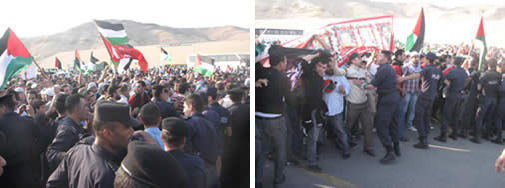
Left: Turkish activists confronting the Jordanian security forces (Velfecr, May 19, 2011); Right: Members of the Turkish delegation carrying a poster with the photographs of the nine shaheeds on board the Mavi Marmara and confronting the Jordanian security forces (Velfecr, May 19, 2011)

Turkish activists in a hospital after suffering injuries in the confrontation with the Jordanian security forces (Velfecr, May 19, 2011)
Clashes on the Egypt-Gaza Strip border (January 2010) during the Lifeline-3 aid convoy. The convoy consisted of about 250 Turks, prominent among whom were IHH activists and their leader Bülent Yıldırım.
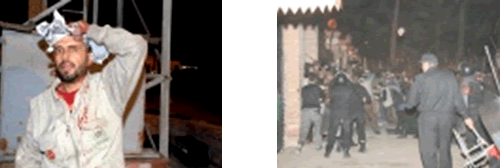
Left: an injured IHH activist wearing a vest similar to that worn by IHH activists who were on board the Mavi Marmara. Right: confrontation with the Egyptian security forces (ihh.org.tr).
Show of support for terrorism (October 26, 2010): in October, a delegation from Turkey, which in our assessment consisted primarily of IHH activists, took part in the Viva Palestina convoy to the Gaza Strip. The PIJ website published photographs of the Turkish delegation members in uniforms, wearing headbands and holding weapons. The faces of the delegation members were blurred and marked with circles. The caption beside the arrows reads “the delegation”.

Members of the Turkish delegation (marked with arrows) visiting operatives of the PIJ military wing (the Al-Quds Brigades forum citing the official Al-Quds Brigades website, October 26, 2010).
Notes:
[1] See our May 19, 2011 article, IHH Leader Yildirim: “We Will Not Hesitate to Sacrifice Shaheeds to Achieve the Flotilla’s Objective”.
[2] Speaking at a press conference held on May 20, 2011 at the IHH headquarters in Istanbul’s Fatih neighborhood, Bülent Yıldırım reiterated (twice) that “we will not carry even a single pocket knife” in the next flotilla (IHH website). A similar remark was made by Bülent Yıldırım at a press conference held during the Mavi Marmara flotilla (“We don’t even carry one pocket knife”, according to Şefik Dinç’s book, “The Bloodstained Mavi Marmara”). In practice, IHH operatives who were on board the Mavi Marmara had prepared a variety of weapons they later used against IDF soldiers.
[3] This is a Turkish Islamist account which takes a hostile stance towards the Jordanian regime. One can therefore assume that it may be occasionally biased or inaccurate, as in the parts that blame the Jordanian security forces for the violent clashes and attempt to shift responsibility from the demonstrators.
[4] Memorial services and rallies took place in Turkey from May 25 to May 31, the anniversary of the violent confrontation on board the Mavi Marmara. They were used as a display of hatred against Israel and as a show of strength of the Islamist organizations.
[5] The speech appeared on an Islamist website (velfecr.com) on May 15, 2008, and was translated into English by MEMRI (“Memri Turkish media blog”). The same demonstration was also attended by Hakan Albayrak, an Islamist journalist whom the Turkish delegation to the Jordanian Nakba Day events asked for protection from the Jordanian security forces.
[6] This is yet another recurring pattern where Turkey provides political, media, and humanitarian assistance to convoys and flotillas whose activists become involved in confrontations with local military or security forces (with Israel, Egypt, and now Jordan).



 RSS
RSS



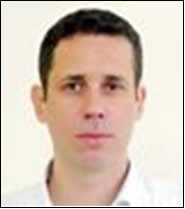

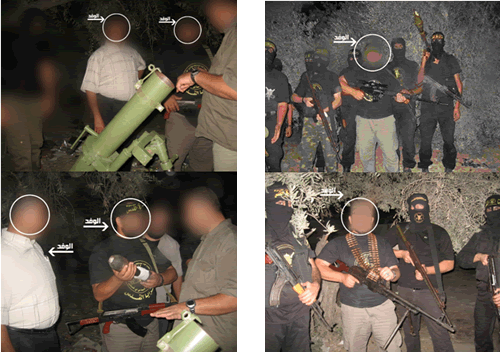
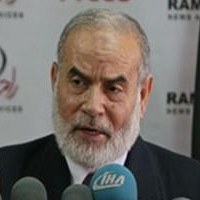
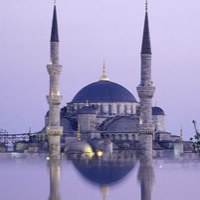
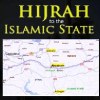
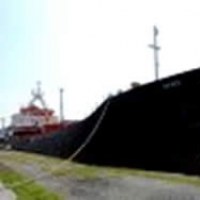
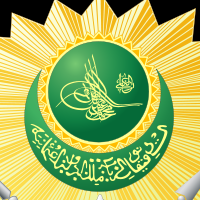




Turkish Islamist Delegation uses Violent Methods during anti-Israeli Propaganda Activities | #Israel #Turkey #IHH http://j.mp/mKIUbv
Turkish Islamist Delegation uses Violent Methods during anti-Israeli Propaganda Activities | #Israel #Turkey #IHH http://j.mp/mKIUbv
Turkish Islamist Delegation uses Violent Methods during anti-Israeli Propaganda Activities | #Israel #Turkey #IHH http://j.mp/mKIUbv
Turkish Islamist Delegation uses Violent Methods during anti-Israeli Propaganda Activities | #Israel #Turkey #IHH http://j.mp/mKIUbv